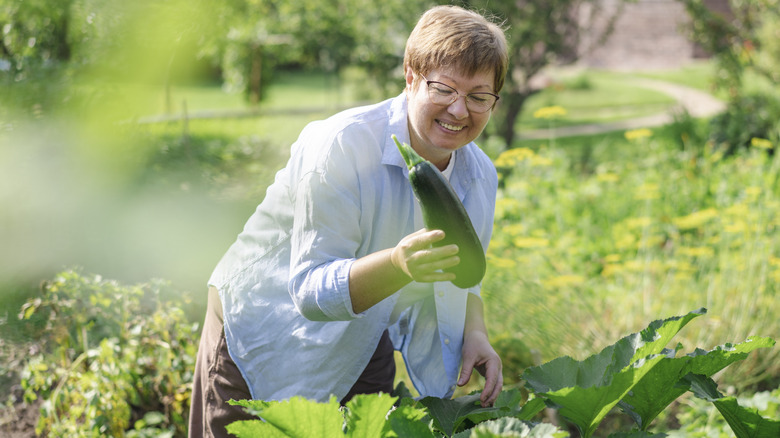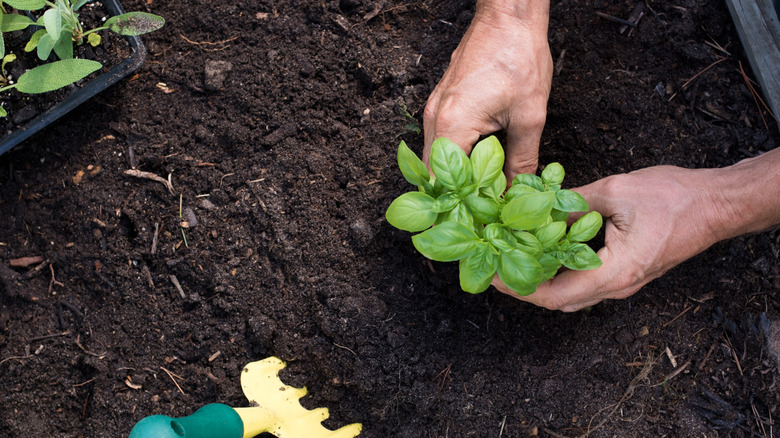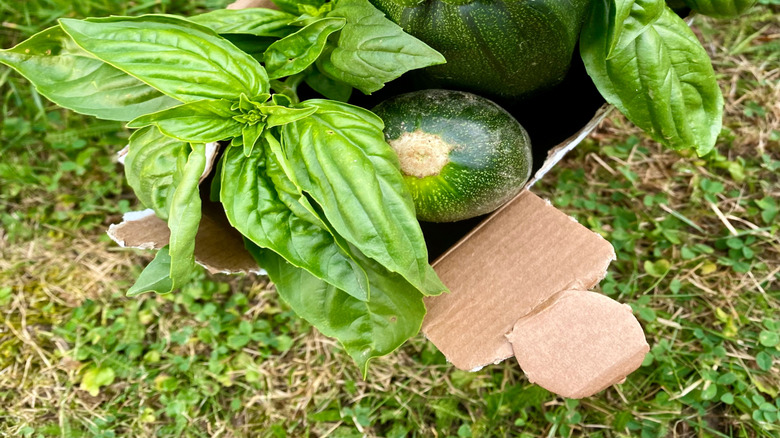The One Herb You Should Plant Alongside Zucchini For All Its Benefits
Arriving at mid to late spring means it's finally time to plant your Cucurbita pepo, otherwise known as zucchini. You can raise the odds of a decent harvest if you avoid some mistakes everyone makes when growing zucchini plants. One lesser-known way to improve your bumper crop of zucchini is to grow it alongside a specific herb used often in Italian dishes. In fact, it would be a mistake not to do so if you're planning to grow them anyway. As it turns out, Ocimum basilicum, otherwise known as basil, is the zucchini plant's best friend in the garden, and the two plants should be grown alongside each other if possible.
Like zucchini, basil grows little flowers that are edible, although a little more mild in intensity than its leaves. While they are great for imparting their flavor into olive oil, vinegars, and salads, the basil flowers are often pinched off by gardeners since allowing basil to blossom slows the leaf production of the herb. However, you may want to let at least some of your herbs flower, specifically next to zucchini plants.
Benefits of letting basil blossom next to zucchini plants
Basil flowers offer a natural way to protect your zucchini plants from common pests. Unfortunately, zucchini is loved by insects, including plant-munching bugs like cucumber beetles, squash bugs, and squash vine borers, which could lay waste to your garden. The essential oils in aromatic herbs like basil are repulsive to many garden pests, which means that allowing them to flower alongside your zucchini can help limit the presence of these bugs in your garden.
According to the Journal of Stored Products Research, this has to do with specific compounds in the oil of basil plants that give them their scent and flavor. Linalool and estragol are not only repellant to bugs but also downright toxic. Growing basil next to your zucchini is like sharing a natural forcefield against pests between plants. You can activate that forcefield by gently caressing the basil leaves in your garden every day to unleash their natural oils.
There are other benefits of this method, as well. One, it allows you to avoid the use of chemical pesticides that can kill both pests and beneficial insects like pollinators. Not to mention, chemical pesticides can also create health issues for people if inhaled or eaten. Secondly, some gardeners believe the close proximity to basil's herbaceous qualities can make zucchini grow and taste better. Either way, it's an eco-friendly way to avoid one of the downsides of growing zucchini plants.
How growing basil can boost your zucchini harvest
As they flower, zucchini plants need pollinators to help them grow healthy, full-sized fruits. Pollinators pass pollen from the male flowers to the female flowers, which then go on to bear zucchini. While you can accomplish this yourself by hand and with a cotton swab, nature will do that for you if you provide pollinators with some incentive. While the saying goes, you will attract more bees with honey, basil flower spikes do a pretty good job on their own. The clustered way in which basil flower spikes bloom allows pollinators a one-stop shop of sorts, where exhausted bees and butterflies can make the most of their excursions. Grown alongside each other, zucchini gets to piggyback off the appeal of basil flowers by freeloading the benefits of more pollinator visits.
Essential oils in basil contain chemical compounds, including linalol, estragol, eugenol, and methyl cinnamate, that have antifungal properties. These natural oils were capable of inhibiting the growth of 22 mold species. It's uncertain that these antifungal properties can be passed to neighboring plants above ground. However, a 2007 study in the Journal of the Science of Food and Agriculture via Connected Papers found that the impacts of basil on "soil organic matter biodegradation, nutritional mineral elements, and bacterial colonies" increased the concentration of beneficial nutrients and inhibited the growth of weeds, pathogens, and bacteria — referred to in the study as "bacterial colonies"— in organic soils. That's just one more reason to grow zucchini next to basil.


